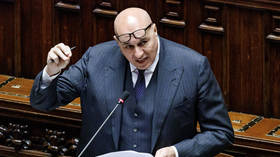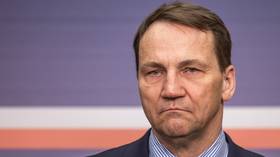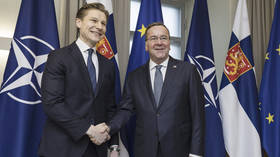France and Poland don’t speak for NATO – Italy

France and Poland have no right to speak for all NATO members when it comes to deploying troops to Ukraine, Italian Defense Minister Guido Crosetto told La Stampa newspaper in an interview published on Sunday. The move would only lead to escalation and damage diplomatic efforts to end the hostilities between Moscow and Kiev, he added.
The minister was commenting on recent statements by French President Emmanuel Macron and Polish Foreign Minister Radoslaw Sikorski, each of whom has entertained the possibility of sending NATO troops to aid Kiev.
Last week, the French leader said the West “cannot exclude” the possibility of NATO forces being deployed to Ukraine. His comments sparked a wave of denials from senior officials of member states, including the UK, Czech Republic, Finland, and Sweden, who insisted that they harbor no such plans. Poland had initially said it would not send any troops to Ukraine.
On Friday, Sikorski stated that Russia’s military operation in Ukraine requires “asymmetric escalation” on the part of the West, adding that “the presence of NATO forces in Ukraine is not unthinkable.” Macron has repeatedly stated that he stands by his remarks. This week, he said there are “no limits” to the West’s options in supporting Kiev.
“France and Poland can speak for themselves [but] not on behalf of NATO,” Crosetto said about the developments. He also stated that making these arguments now “makes no sense.” Any potential NATO troop deployment to Ukraine “means taking a step towards one-sided escalation that would block the path to diplomacy,” the minister warned.
According to Crosetto, Kiev’s Western backers should focus on diplomacy, since they are struggling to keep up with Russia’s military production capacity. Moscow is “more equipped and agile than NATO” when it comes to military production, the defense minister said, adding that “the West has discovered that it has a much lower production capacity than Russia.”
The minister noted that NATO has managed to slightly increase its ammunition production capacity in the year since it promised to supply Kiev with 1 million artillery rounds, but that it still remains lower than Russia’s capacity.
Under these circumstances, the West “must give all possible support to Kiev,” but consider helping in another way, Crosetto said, adding that Western nations should “activate diplomatic channels.”
Earlier, Pope Francis called on Kiev to “have the courage” to engage in talks with Moscow to save lives rather than allowing the bloodshed to continue. He also said that there is no shortage of nations and international actors, including himself, who are willing to act as mediators in this regard.
Moscow has repeatedly said that it is ready for talks with Kiev at any moment, as long as the reality on the ground is taken into account. Kiev withdrew from the Istanbul negotiations with Russia in spring 2022 and has since put forward a “peace plan” demanding Russian troops withdraw from all territories Ukraine claims as its own before any talks can even start. Russia has dismissed these demands as “absurd.”













